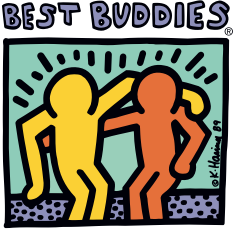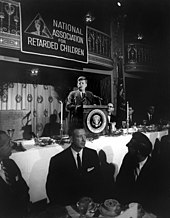
I Am Sam is a 2001 American drama film co-written and directed by Jessie Nelson. It stars Sean Penn, Michelle Pfeiffer, Dianne Wiest, Dakota Fanning, Elle Fanning, Richard Schiff, Loretta Devine and Laura Dern.
The disability rights movement is a global social movement that seeks to secure equal opportunities and equal rights for all people with disabilities.

Timothy Perry Shriver is an American disability rights activist, film producer, and former educator who has been Chairman of Special Olympics since 1996 and is the founder of UNITE. He is a member of the Kennedy family as the third child of Eunice Kennedy Shriver, and Sargent Shriver, who helped found the Peace Corps.

Willowbrook State School was a state-supported institution for children with intellectual disabilities located in the Willowbrook neighborhood of Staten Island in New York City from 1947 until 1987.
Self-advocacy is the act of speaking up for oneself and one's interests. It is used as a name for civil rights movements and mutual aid networks for people with intellectual and developmental disabilities. The term arose in the broader civil rights movements of the 1960s and 1970s, and is part of the disability rights movement. Today there are self-advocacy organizations across the world.
The term sheltered workshop refers to an organization or environment that employs people with disabilities separately from others, usually with exemptions from labor standards, including but not limited to the absence of minimum wage requirements.
A group home, congregate living facility, care home, adult family home, etc., is a structured and supervised residence model that provides assisted living and medical care for those with complex health needs. Traditionally, the model has been used for children or young people who cannot live with their families or afford their own homes, people with chronic disabilities who may be adults or seniors, or people with dementia and related aged illnesses. Typically, there are no more than six residents, and there is at least one trained caregiver there 24 hours a day. In some early "model programs", a house manager, night manager, weekend activity coordinator, and four part-time skill teachers were reported. Originally, the term group home referred to homes of 8 to 16 individuals, which was a state-mandated size during deinstitutionalization. Residential nursing facilities, also included in this article, may be as large as 100 individuals in 2015, which is no longer the case in fields such as intellectual and developmental disabilities. Depending on the severity of the condition requiring one to need to live in a group home, some clients are able to attend day programs and most clients are able to live normal lifestyles.

Best Buddies International is an American nonprofit 501(c)(3) organization. It consists of volunteers that create opportunities for people with intellectual and developmental disabilities (IDD). The program's main purpose is to allow volunteers to be paired up with a buddy with an intellectual and developmental disability and provide them with a friend or a mentor. Best Buddies is the world's largest organization dedicated to ending the social, physical and economic isolation of the 200 million people with IDD. It is an international movement that has spread to over 54 countries worldwide.

Tropic Thunder is a 2008 satirical action comedy film directed by Ben Stiller, who wrote the screenplay with Justin Theroux and Etan Cohen. The film stars Stiller, Jack Black, Robert Downey Jr., Jay Baruchel, and Brandon T. Jackson as a group of prima donna actors making a Vietnam War film. When their frustrated director drops them in the middle of a jungle and dies in an accident, they are forced to rely on their acting skills to survive the real action and danger. Tropic Thunder parodies many prestigious war films, the Hollywood studio system, and method acting. The ensemble cast includes Nick Nolte, Danny McBride, Matthew McConaughey, Bill Hader, and Tom Cruise.

Intellectual disability (ID), also known as general learning disability in the United Kingdom and formerly mental retardation, is a generalized neurodevelopmental disorder characterized by significantly impaired intellectual and adaptive functioning. It is defined by an IQ under 70, in addition to deficits in two or more adaptive behaviors that affect everyday, general living. Intellectual functions are defined under the DSM-5 as reasoning, problem‑
Research published from 2000 to 2020 illustrates increased prevalence rates of sexual violence against people with intellectual disabilities, compared to the general population.:61 The World Health Organization (WHO) funded a study which concluded that 15% of the adult population worldwide in 2012 had a disability, putting them at increased risk of physical, sexual, and intimate partner violence. Of that 15%, 6.1% had intellectual disability with 5.5% experiencing sexual violence. In another 2012 report, the WHO found that worldwide, children with intellectual disabilities experienced a 4.6 times greater risk of sexual violence than those without disability.
The Family Movement, also known in the past as the Parent Movement, is an arm of the disability rights movement, a larger social movement. The Family Movement advocates for the economic and social rights of family members with a disability. Key elements include: social inclusion; active participation; a life of meaning; safety; economic security; accessibility and self-determination. The family movement has been critical in closing institutions and other segregated facilities; promoting inclusive education; reforming adult guardianship to the current supported decisionmaking; increasing access to health care; developing real jobs; fighting stereotypes and reducing discrimination.
Gunnar Dybwad (1909–2001) was an American professor and advocate for the rights of people with disabilities, particularly developmental disabilities. He is best known for his support for the social model of disability, reframing disability accommodations as a matter of civil rights, not medical treatment. The American Association on Intellectual and Developmental Disabilities gives out the Dybwad Humanitarian Award annually in his honor.
In modern usage, retard is a pejorative term either for someone with a mental disability or for someone who is considered stupid, slow to understand, or ineffective in some way. The adjective retarded is in the same way used for something very foolish or stupid. Because it is now considered offensive, the word is commonly referred to by the euphemisms "r-word" and "r-slur".
Hall v. Florida, 572 U.S. 701 (2014), was a United States Supreme Court case in which the Court held that a bright-line IQ threshold requirement for determining whether someone has an intellectual disability is unconstitutional in deciding whether they are eligible for the death penalty.
Mary Meyers Rosenfield was an American community leader, active in special education and services for people with developmental disabilities in Texas.

Pennsylvania Association for Retarded Citizens (PARC) v. Commonwealth of Pennsylvania, 334 F. Supp. 1257, was a case where the Commonwealth of Pennsylvania was sued by the Pennsylvania Association for Retarded Citizens (PARC), now The Arc of Pennsylvania, over a law that gave public schools the authority to deny a free education to children who had reached the age of 8, yet had not reached the mental age of 5. The law had also been used by the state in multiple occasions to deny free public education to children who had a hard time integrating into classroom environments and schools. This was the first major legal case to provide equality to students with disabilities. The case was filed and settled by the United States District Court for the Eastern District of Pennsylvania and lasted between 1971 and 1972. The case was over seen by three judges, Circuit Judge Adams, and two District Judges, Masterson and Broderick. The language used during this case is outdated to modern times; therefore, the use of the word "mentally retarded" refers to any intellectual disability.

Singapore does not have a formal definition of disability. Singapore signed on to the Convention on the Rights of Persons with Disabilities in 2013 and coordinates the Enabling Masterplan with both government and non governmental organisations.
A Qualified Intellectual Disability Professional, often referred to as a QIDP for short is a professional staff working with people in community homes who have intellectual and developmental disabilities and was previously known as a Qualified Mental Retardation Professional or QMRP. The change in terminology was implemented after the Centers for Medicaid and Medicare Services (CMS) modified the State Operations Manual Appendix J - Guidance to Surveyors: Intermediate Care Facilities for Individuals with Intellectual Disabilities The changes were implemented after President Obama signed Rosa's Law.









